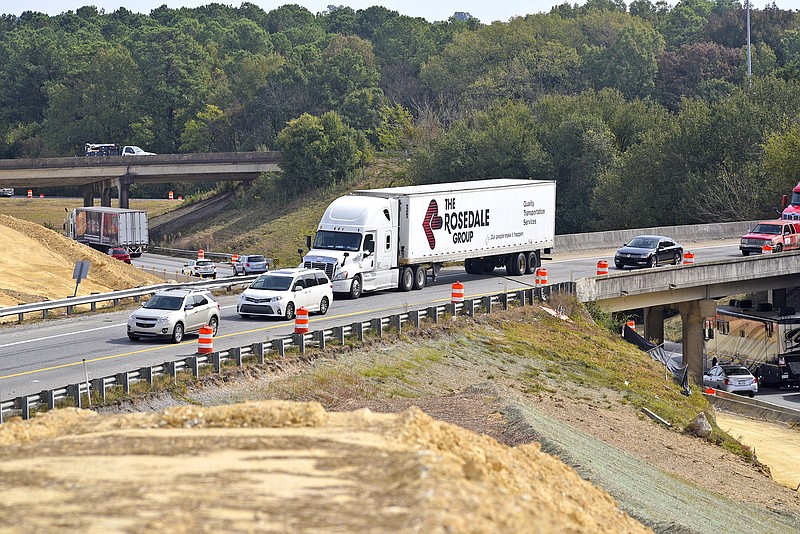NASHVILLE - A 10-year, $10.5 billion transportation program approved by Tennessee lawmakers in 2017 is now expected to travel a far longer road toward completion, top state transportation officials say.
Call it the 20-year plan. Because that's how long former Gov. Bill Haslam's 962-project Improve Act is now expected to take to finish, according to Gov. Bill Lee's administration.
The problem, Tennessee Department of Transportation Commissioner Clay Bright and TDOT Deputy and Chief Engineer Paul Degges said, stems from several issues.
Among them are the gas and diesel tax-increase concessions made by Haslam to win over his fellow Republicans in the GOP-run General Assembly, as well as lawmakers' balking at tying fuel tax increases to the Consumer Price Index's annual rate of inflation.
Meanwhile, inflation for road construction, Washington's last-minute approvals of federal highway spending bills that led to delays in bid lettings, and projected additional costs because of transportation projects getting pushed into the future add to the litany of woes.
Problems aren't expected to impact TDOT's already-begun work on "the Split" in Chattanooga. It's a $132.5 million project to rebuild the Interstate 75/Interstate 24 interchange at the Tennessee-Georgia state line in Chattanooga and East Ridge.
But TDOT's Degges said in response to questions posed by the Times Free Press that some other local projects may be impacted.
House Transportation Chairman Dan Howell, R-Georgetown, said he'd been briefed previously by Bright about the situation.
"Unfortunately, there's just so many slices to the pie," the Bradley County lawmaker said. "There are several things that have created this problem."
Under the legislation, Haslam sought to raise gas and diesel taxes for the first time since 1989. But he didn't get all he sought. For example, he originally wanted to raise prices on gas and diesel by 7 cents and 12 cents per gallon, respectively. Those increases ended up at 6 cents and 12 cents, taking gas to 27.4 cents per gallon and diesel to 28.4 cents.
The governor also had to make other compromises. Legislative Republicans successfully insisted the governor had to cut non-highway related taxes by a greater amount so they could argue to constituents that the package resulted in a net tax cut to them. Behind the scenes, then-Republican House Speaker Beth Harwell, who was preparing for a 2018 race for governor, opposed the legislation.
Howell said the 6-cent increase "is getting eaten up at the rate of about 4.4% per year" due to construction inflation. "It is a concern. You look at the revenue you have and then you have to decide, well, we can do these projects and how long is it going to take?"
He said he believes Tennessee officials "manage our resources well. But I think it is unfortunate that we have to make a determination on how much money we can spend this year and next year and the next year in order to accomplish the goals. That's the reality."
The "good news," Howell said, is "the last time I checked, we're close to 50 percent of having those 900-and-odd projects in some form of development. Some are in construction like there in Chattanooga. Some are in engineering. Some are in design, but they are in the works and they are funded. But it's just going to take a little bit longer to get where we want to go."
Bright and Degges discussed the issue at length last week during TDOT's budget hearing before Lee as the governor develops the fiscal year 2020-2021 state budget he will submit to legislators next year.
Asked about the impact of concessions made in 2017 to get the increase passed, Bright said, "well, we knew what we had to do as far as 10 years, and that's what it took. But you know what? What I've been told is getting something passed is better than not having anything pass."
Bright, who became commissioner in January, said officials are "certainly appreciative of what we got. But where we started, I mean, it's basically a math equation."
Degges, a TDOT veteran, observed "the best piece of legislation that can be introduced in the General Assembly is one that can get 50 votes in the House, 17 in the Senate and the governor to sign it."
He said "we knew we weren't going to be able to finish it in 10 years" but later added, "we didn't know what inflation was going to be."
Lee told reporters there's "a real challenge for us in letting contracts. It just pushes off our ability to improve our roads and to maintain what we have. We're in really good shape on our roads."
But Lee, a Republican, said "we're not in a corner." The state will need to "stay on top of that" and he plans to encourage Tennessee's U.S. senators and congressmen to back a pending federal transportation bill.
The governor also noted that, unlike most states, Tennessee's $2.42 billion transportation program is a pay-as-you-go program and doesn't rely on bonds. State appropriations account for just short of $1 billion in last year's budget, with Uncle Sam picking up just over $1 billion. The remaining funding comes from other state sources.
At this juncture, the plan is to "take what we have then and strategize and know fully when those projects are going to come on line," Lee said. "And if there are adjustments that need to be made, then we develop a plan to make them."
While Haslam's concessions to get his bill passed were expected to extend the completion date on the 962 projects, last week's budget hearing was the first time anyone said it had actually doubled.
Contact Andy Sher at asher@timesfreepress.com or 615-255-0550. Follow him on Twitter @AndySher1.
